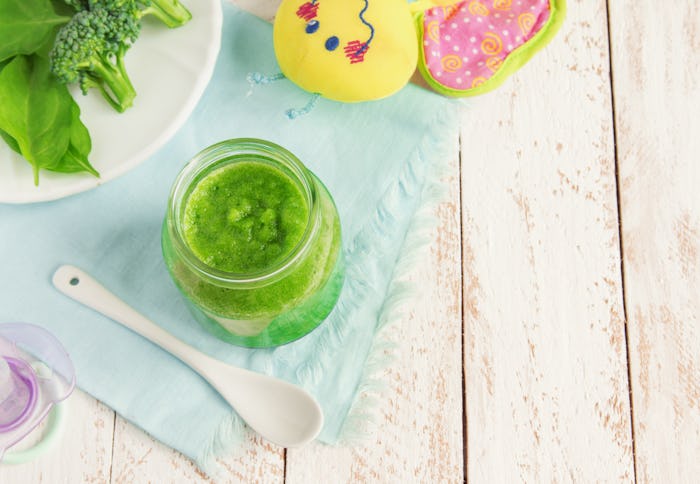You’re finally on a pretty solid schedule when it comes to feeding your baby. You know how much breast milk or formula is enough — in fact, you’re a pro at that now — but babies typically start on solid or jarred foods anywhere between 4 and 6 months, and solid foods seem like an entirely different ballgame to some moms. How many jars of baby food should a baby eat? Or if you’re making your own food, how many ounces of solids should they be getting a day for a well-balanced diet?
How do you know when it’s time? "Look for physical signs to start your baby on solids, like the ability to support themselves, good head and neck control, and capability to swallow food. Always check with your pediatrician first before starting your baby on solids," Amanda Capriglione, a registered and certified dietitian nutritionist with Northwell Health in Long Island, says in an email to Romper.
Capriglione says it’s a good idea to start small when introducing solids, and work your way up, increasing the amount over time. "4 to 6-month-old babies need about 28 to 32 ounces of formula or breast milk daily, 3 to 5 tablespoons of single-grain, iron-fortified cereal mixed with breast milk or formula, and 1 to 2 tablespoons each of puréed fruit and vegetables, one to two times per day," she says.
Starting at 7 months, babies will continue to need 30 to 32 ounces of breast milk or formula in addition to solids until they are 10 to 12 months old, where that amount will decrease to 24 to 30 ounces daily.
Capriglione says 7-month-old babies need 3 to 5 tablespoons of single-grain, iron-fortified cereal mixed with breast milk or formula, and 2 to 3 tablespoons each of puréed fruit and vegetables two times per day, in addition to 1 or 2 tablespoons of protein foods, plus snacks like baby cookies or toast.
"[8-month-old] babies need 5 to 8 tablespoons of single-grain, iron-fortified cereal mixed with formula or breast milk, 2 to 3 tablespoons each of strained or mashed (soft) fruit and vegetables, two times per day, one to two protein foods two times per day, and some more yummy and interesting snacks, like yogurt," Capriglione says.
In addition to the 5 to 8 tablespoons of the cereal, 9-month-old babies need 2 to 4 tablespoons each of soft fruits and vegetables, two times per day, 2 to 3 tablespoons of tender chopped meat or protein foods two times a day, and snacks.
During the time period of 10 to 12 months, babies’ diets change a lot according to Capriglione. "They finally want and can eat some foods like pasta and bread," she says. "By the time your baby is 10 to 12 months old, he or she may be eating mostly a solid food diet, and variety is key when providing food for your baby," she says. "Remember, a rainbow of food colors helps baby gets the most nutrients as possible for healthy growth."
Suggestions for foods safe and recommended for babies who are 10 to 12 months old include 5 to 8 tablespoons of dry infant cereal mixed with formula or breast milk, 2 to 4 tablespoons each of strained or mashed (soft) fruit and vegetables, two times per day, 2 to 3 tablespoons of finely chopped table meats, fish without bones, and milk cheeses two times per day, a quarter to a half a cup of mashed potatoes, pasta, or bread, two times per day, and continue with snacks like yogurt and toast.
Babies don't start eating meat until they're 7 months old, according to Capriglione. If you’re a vegetarian and would like your child to be on a plant-based diet as well, it’s generally safe, but as always, check with your pediatrician first. For the protein sources, choose nut butters, scrambled eggs, or other fruits and veggies high in protein. "If you are a vegetarian or vegan and plan to introduce mostly plant-based foods into your child’s diet, he or she may need a B12 supplement," Capriglione says. "Formula-fed vegan babies get their vitamin B12 from the specialized formula, and breastfeeding vegan mothers must make sure to consume adequate vitamin B12 in their diet. Vitamin B12 is typically included in most over-the-counter infant vitamin drops, and many ready-to-eat cereals and milk substitutes," she adds.
If you’re planning on feeding your baby jars of food, be sure to check out the label for how many ounces there are in each jar and go from there to follow the guidelines for a well-balanced diet. Some babies can finish an entire jar of food when they’re around 7 or 8 months old, but many start out eating only two or three spoonfuls of solids during their "first" meals. Remember, every baby is different, and they’ll typically let you know they’re done eating by clamping their mouths closed or turning away from the spoon — even if it does look like an airplane coming in for a landing.
